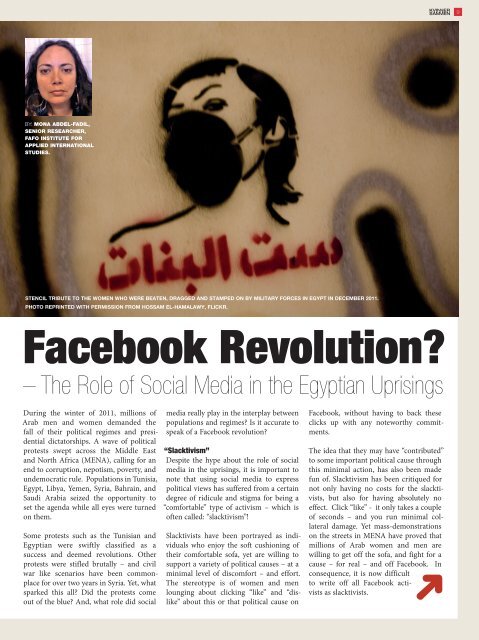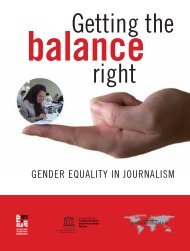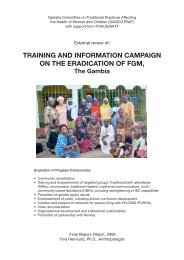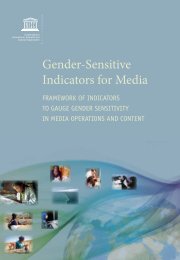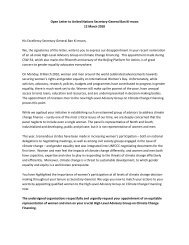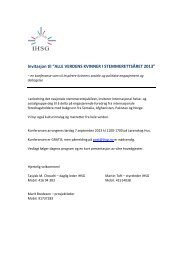8av: gro lindstadI slutten av mai i år møtte jeg den egyptiske journalisten Hania Moheebi Belfast, hvor hun var invitert som deltaker og innleder under konferansentil Nobel Women´s Initiative. Moheeb bekreftet det vi har fryktet: at kvinnersom deltar i protester i Egypt i økende grad utsettes for grov vold, og atMorsi-regimet misbruker makt på samme måte som det tidligere regimet.Å gi volden et ansiktEn ny undersøkelse fra UN Women dokumentererøkningen av vold mot kvinneri Egypt etter revolusjonen. Den viser at99,3 prosent av egyptiske kvinner har værtutsatt for en eller annen form for voldeller seksuell trakassering. 58 prosent rapporterteom økt seksuell trakassering etterrevolusjonen. Den 25. januar 2013, påtoårsdagen for starten av revolusjonen iEgypt, ble det registrert 19 overgrep motkvinner på Tahrir-plassen.En egyptisk advokat og menneskerettighetsaktivist,Ragia Omran, uttalte nyligi et intervju med Aljazeera, at det finnesen nærmest total mangel på beskyttelsefor kvinner som utsettes for overgrep. Deter liten oppfølging fra politiets og domstolenesside. Omran påpekte at det er etbehov for en offentlig fordømming av vold.Med dette som bakteppe, blir HaniaMoheeb sin historie sterk, og et bevis påHania Moheeb. Foto: Gro Lindstaddet som foregår. I januar 2013 dro Haniatil presidentpalasset i Kairo for å delta ien demonstrasjon mot president Morsiog den sittende regjeringen. Det var kommeten oppfordring til en egen kvinnemarsjmot Morsi. Fra presidentpalassetdro Hania videre til Tahrir-plassen, hvorhun skulle treffe en bekjent. Hun fortalteat hun følte seg ukomfortabel da hun komdit, men uten å forstå hvorfor. En gruppejenter omringet henne for å beskytte henne,og hadde nok, i følge Hania, fått med segen stemning på plassen som hun selv ikkehadde forstått hva var.Plutselig ble hun revet vekk fra gruppenav en gjeng med menn trakk henne moten annen del av plassen. Der ble hunslått, dratt i håret, forsøkt kvelt med sitteget skjerf, og hun følte hender og fingrei alle åpninger og over alt på kroppen.Etter hennes egen tidsberegning pågikkdet hele 30-45 minutter, mens hun heletiden forsøkte å ikke falle helt over endei redsel for å da bli voldtatt av de hissigemennene. Hun oppfattet at alt de foretokseg, fra start til slutt, var godt planlagt,organisert og innøvd. Dette støttes ogsåav andre som snakker om volden i Egypt,som sier at angrepene er organiserte, at dealltid skjer på kveldstid etter at det har blittmørkt, og at politiet aldri er i nærheten avdet som skjer.Hania ble til slutt reddet av andre som heletiden hadde forsøkt å komme til. En annengruppe menn dro av seg beltene sine ogbegynte å slå løs på overgriperne slik atde slapp taket og folkemengden ble spredt.Hun ble hjulpet av en lege og fraktet tilsykehuset i ambulanse. Dit kom hun medklær som var totalt revet i stykker, og utenbukser eller noe <strong>ned</strong>entil.På sykehuset fikk hun tilkalt mannen sinsom kom og støttet henne. Sykehusansattesa til henne og mannen at de måtte glemmedet som hadde skjedd, og verken anmeldedet, eller snakke mer om det, fordi det varså tabubelagt. Fem dager etter at overgrepenehadde funnet sted, gjorde HaniaMoheeb akkurat det motsatte. Hun stofrem på egyptisk TV og fortalte historien.Mannen hennes var med for å støtte henne.I følge Hania er det første gang en egyptiskmann har stilt opp på denne måtensammen med ektefellen og vist henne sinåpenlyse støtte.I mangel av politiets vilje og evne til åredde kvinner som Hania fra overgrep harkvinnegrupper som Tahrir Bodyguardsog Operation Anti-Harassment blittorganisert.
9BY: Mona Abdel-Fadil,Senior Researcher,Fafo Institute forApplied internationalstudies.Stencil tribute to the women who were beaten, dragged and stamped on by military forces in Egypt in December 2011.Photo reprinted with permission from Hossam el-Hamalawy, Flickr.Facebook Revolution?– The Role of Social Media in the Egyptian UprisingsDuring the winter of 2011, millions ofArab men and women demanded thefall of their political regimes and presidentialdictatorships. A wave of politicalprotests swept across the Middle Eastand North Africa (MENA), calling for anend to corruption, nepotism, poverty, andundemocratic rule. Populations in Tunisia,Egypt, Libya, Yemen, Syria, Bahrain, andSaudi Arabia seized the opportunity toset the agenda while all eyes were tur<strong>ned</strong>on them.Some protests such as the Tunisian andEgyptian were swiftly classified as asuccess and deemed revolutions. Otherprotests were stifled brutally – and civilwar like scenarios have been commonplacefor over two years in Syria. Yet, whatsparked this all? Did the protests comeout of the blue? And, what role did socialmedia really play in the interplay betweenpopulations and regimes? Is it accurate tospeak of a Facebook revolution?“Slacktivism”Despite the hype about the role of socialmedia in the uprisings, it is important tonote that using social media to expresspolitical views has suffered from a certaindegree of ridicule and stigma for being a“comfortable” type of activism – which isoften called: “slacktivism”!Slacktivists have been portrayed as individualswho enjoy the soft cushioning oftheir comfortable sofa, yet are willing tosupport a variety of political causes – at aminimal level of discomfort – and effort.The stereotype is of women and menlounging about clicking “like” and “dislike”about this or that political cause onFacebook, without having to back theseclicks up with any noteworthy commitments.The idea that they may have “contributed”to some important political cause throughthis minimal action, has also been madefun of. Slacktivism has been critiqued fornot only having no costs for the slacktivists,but also for having absolutely noeffect. Click “like” - it only takes a coupleof seconds – and you run minimal collateraldamage. Yet mass-demonstrationson the streets in MENA have proved thatmillions of Arab women and men arewilling to get off the sofa, and fight for acause – for real – and off Facebook. Inconsequence, it is now difficultto write off all Facebook activistsas slacktivists.
- Page 1 and 2: Women united no. 2 - 2013
- Page 4 and 5: 4Section« Kvinnene, som for to år
- Page 6 and 7: 6Photo: Rabii Kalboussi, Your Middl
- Page 10 and 11: 10During battles, I will be behind
- Page 12 and 13: 12Bokanmeldelser:Journalistens blik
- Page 14 and 15: 14Painting of Mursi. Photo: Thierry
- Page 16 and 17: 16Don’t steroetype me. Photo: Mia
- Page 18 and 19: 18BY: Hibaaq Osman,Founder and CEO,
- Page 20 and 21: 20age and leadership in the uprisin
- Page 22 and 23: 22SectionSnapshot from «Because Ou
- Page 24 and 25: 24av: Amal A. Wahab,frilansjournali
- Page 26 and 27: 26AV: ODA gillebergHvis den syriske
- Page 28 and 29: 28Syria, og de har ingen sperrer,
- Page 30 and 31: 30BY: Lina Abou-Habib,excetutive di
- Page 32 and 33: 32AV: Monika Lindbekk,Stipendiat ve
- Page 34 and 35: 34Debatten om familielovenedreier s
- Page 36 and 37: 36Kvinner underpress etter denarabi
- Page 38 and 39: 38Av: Liv Tønnessen,Senior researc
- Page 40: 40BPostAbonnementReturadresse: FOKU


